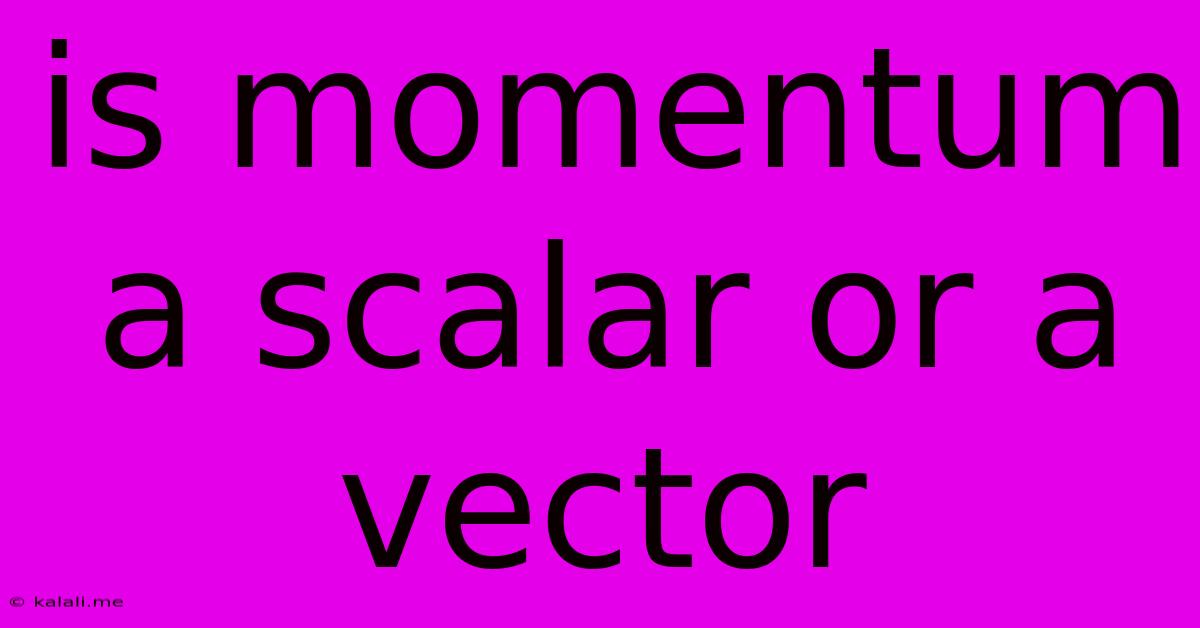Is Momentum A Scalar Or A Vector
Kalali
May 21, 2025 · 3 min read

Table of Contents
Is Momentum a Scalar or a Vector? Understanding Linear Momentum
Meta Description: Confused about whether momentum is a scalar or vector quantity? This article clarifies the nature of momentum, explaining its definition, formula, and why it's definitively a vector. Learn about the implications of momentum's vector nature in physics.
Momentum is a crucial concept in physics, describing the "quantity of motion" an object possesses. But is momentum a scalar or a vector? The short answer is: momentum is a vector quantity. This means it possesses both magnitude and direction. Understanding this distinction is vital for correctly applying momentum principles in various physical scenarios.
Defining Momentum
Momentum (usually denoted by the letter p) is defined as the product of an object's mass (m) and its velocity (v):
p = m * v
While mass is a scalar (it only has magnitude), velocity is a vector (it has both magnitude – speed – and direction). Since momentum is the product of a scalar and a vector, the resulting quantity, momentum, inherently retains the vector nature of velocity.
Why Momentum is a Vector
The vector nature of momentum is crucial because it directly reflects the direction of motion. Consider these examples:
- A moving car: The momentum of a car traveling north at 60 mph is different from the momentum of a car traveling south at 60 mph, even though their speeds are identical. The direction component of the momentum vector distinguishes these two situations.
- Collisions: In analyzing collisions, the direction of momentum is paramount. The conservation of momentum principle states that the total momentum of a closed system remains constant. This principle considers both the magnitude and direction of momentum before and after a collision. Ignoring the directional aspect would lead to inaccurate predictions.
- Impulse: Impulse, the change in momentum, is also a vector quantity. The impulse delivered to an object depends on the force's magnitude and direction, directly impacting the change in the object's momentum vector.
Implications of Momentum's Vector Nature
The vector nature of momentum has profound implications in various areas of physics, including:
- Classical Mechanics: Solving problems involving collisions, projectile motion, and other dynamical systems requires a vector approach to momentum. Ignoring the direction component would render calculations incorrect.
- Rocket Science: Understanding the vector nature of momentum is crucial for designing rockets. The ejection of propellant in a specific direction changes the rocket's momentum vector, enabling propulsion.
- Relativistic Mechanics: Even in Einstein's theory of special relativity, where mass and energy are intertwined, momentum remains a four-vector, preserving its fundamental vector characteristics.
Understanding Scalar vs. Vector Quantities
To solidify our understanding, let's briefly distinguish between scalar and vector quantities:
- Scalar quantities: These are quantities characterized solely by magnitude (size). Examples include mass, temperature, and speed.
- Vector quantities: These quantities possess both magnitude and direction. Examples include velocity, force, displacement, and, as we've established, momentum.
In conclusion, the inherent vector nature of momentum stems from its definition, being the product of mass and velocity. The direction of momentum is just as important as its magnitude in understanding and applying this fundamental concept across diverse physics problems. Ignoring this vector property would lead to incomplete and inaccurate analysis.
Latest Posts
Latest Posts
-
How Did Sucre Get Out Of Sona
May 21, 2025
-
What Is The Past Tense Of Went
May 21, 2025
-
Can An Automatic Car Be Towed
May 21, 2025
-
Convert Yearly Interest Rate To Monthly
May 21, 2025
-
Meaning Of Sorry For Your Loss
May 21, 2025
Related Post
Thank you for visiting our website which covers about Is Momentum A Scalar Or A Vector . We hope the information provided has been useful to you. Feel free to contact us if you have any questions or need further assistance. See you next time and don't miss to bookmark.